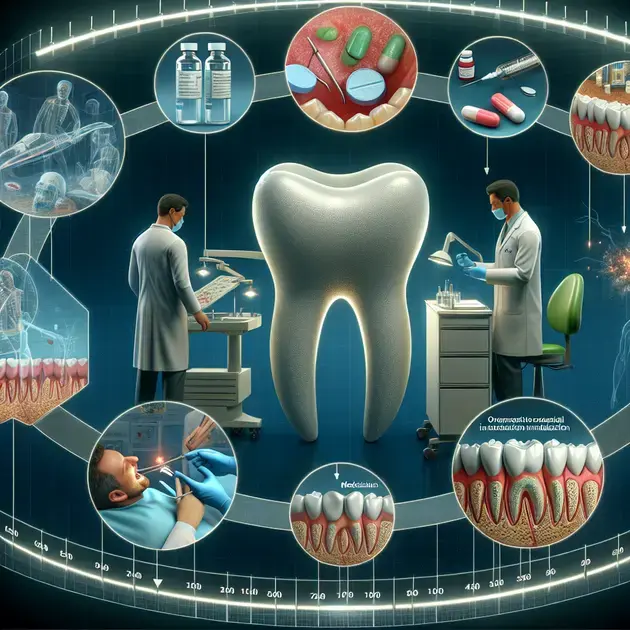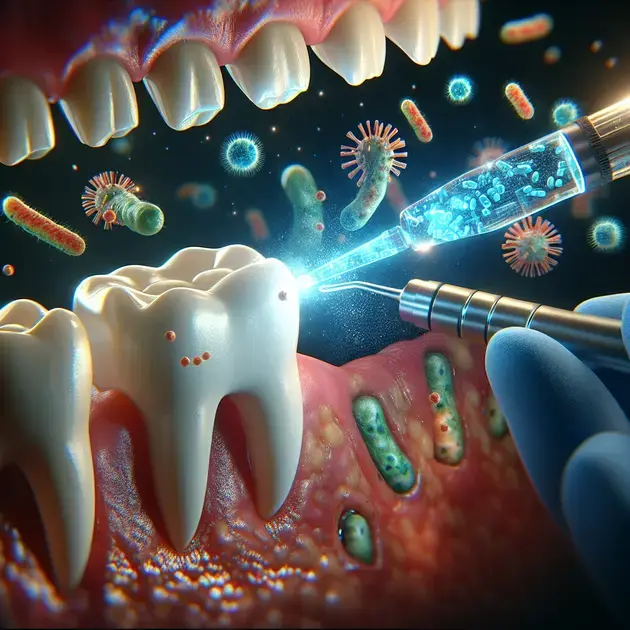Periodontitis can be a serious condition that requires attention and proper treatment. With the right medication and care, it is possible to effectively manage periodontitis and prevent further complications. In this blog post, we will discuss 7 easy steps to help you navigate through the process of treating periodontitis with effective medication.
One of the key aspects of treating periodontitis is understanding the importance of following a consistent medication regimen. By incorporating medication into your daily routine, you can take proactive steps towards combating the infection and promoting oral health.

Understanding the Basics of Periodontitis Treatment with Medication
When it comes to treating periodontitis with medication, it’s essential to understand the basics of how these medications work. Typically, medication for periodontitis includes antibiotics, antimicrobial mouth rinses, and enzyme suppressants. These medications aim to reduce the bacteria causing the infection and inflammation in the gums, aiding in the healing process.
One essential step in understanding periodontitis treatment is knowing the correct dosage and frequency for each medication. This information can usually be found on the prescription label or provided by your healthcare provider. It’s crucial to follow these instructions carefully to ensure the medication’s effectiveness.
To access more detailed information about periodontitis medication and treatment guidelines, websites like WebMD and the American Dental Association (ADA) offer valuable resources. These platforms provide comprehensive insights into the various medications available, their benefits, and potential side effects.
Supplementing your knowledge with reputable sources like WebMD and ADA can empower you to make informed decisions about your periodontitis treatment. By understanding the basics of periodontitis medication, you can actively participate in managing your oral health and overall well-being.
The Importance of Consistent Medication Regimen for Periodontitis
Consistency is key when it comes to managing periodontitis with medication. Establishing a regular medication regimen helps ensure that you receive the full benefits of the prescribed treatment. Missing doses or irregular use can hinder the medication’s effectiveness and potentially prolong the healing process.
To maintain a consistent medication regimen for periodontitis, consider setting up reminders using smartphone apps like Mango Health or CareZone. These applications allow you to schedule medication doses, track your intake, and receive notifications to ensure you never miss a dose.
Additionally, consulting with your dentist or healthcare provider about the importance of consistency in your medication regimen is crucial. They can offer personalized advice and strategies to help you stay on track with your treatment plan.
Understanding the significance of consistent medication use for periodontitis is vital in achieving positive outcomes. By integrating your medication schedule into your daily routine and leveraging reminder apps, you can actively support your oral health journey.
Tips for Incorporating Medication into Your Daily Routine
Incorporating medication into your daily routine is essential for effectively managing periodontitis. One helpful tip is to align your medication intake with specific daily activities, such as brushing your teeth or having meals. This association can serve as a visual cue to ensure you take your medication regularly.
Utilizing medication management tools like Medisafe or MyTherapy can also streamline the process of incorporating medication into your daily routine. These apps offer features like dosage tracking, refill reminders, and health journaling to enhance your medication experience.
Another practical tip is to create a designated medication station in your home where you can store and organize your periodontitis medication. This dedicated space can help you easily access your prescribed medications and establish a routine around taking them.
By implementing these tips and integrating medication into your daily habits, you can promote consistency and adherence to your periodontitis treatment plan. Remember, small adjustments in your routine can have a significant impact on your overall oral health.

Effective Periodontitis Medication for Quick Relief
When it comes to treating periodontitis, finding effective medication for quick relief is crucial. Periodontitis is a serious gum infection that damages the soft tissue and can destroy the bone that supports your teeth if left untreated. The right medication can help alleviate pain, reduce inflammation, and fight the bacteria causing the infection. It is essential to work with your dentist to determine the most suitable medication for your specific case.
One effective medication for quick relief from periodontitis is antibiotics. These prescription medications are used to kill the bacteria causing the infection and prevent it from spreading further. Common antibiotics prescribed for periodontitis include doxycycline, tetracycline, and minocycline. These medications can be in the form of pills, gels, or mouth rinses, depending on the severity of the infection.
In addition to antibiotics, antimicrobial mouth rinses can also be beneficial in treating periodontitis. These rinses contain antiseptic ingredients that help reduce the amount of bacteria in your mouth, promoting healing and preventing the infection from worsening. Using an antimicrobial mouth rinse as part of your daily oral hygiene routine can complement the effects of other medications and treatments.
For more severe cases of periodontitis, your dentist may recommend a combination of medications, including antibiotics, antimicrobial mouth rinses, and anti-inflammatory drugs. This comprehensive approach targets the infection from multiple angles, providing quick relief and promoting faster healing. It is essential to follow your dentist’s instructions carefully and complete the full course of medication for optimal results.
In conclusion, effective periodontitis medication for quick relief plays a vital role in managing the infection and preventing further damage to your gums and teeth. By working closely with your dentist and following their treatment plan, you can effectively combat periodontitis and restore your oral health.
Enhancing Periodontitis Treatment Through Medication Adherence
Improving the outcomes of periodontitis treatment relies heavily on medication adherence. Adherence to medication refers to taking the prescribed medications consistently and as directed by your healthcare provider. In the case of periodontitis, adherence to medication is essential for controlling the infection, reducing inflammation, and promoting gum tissue healing.
One way to enhance periodontitis treatment through medication adherence is to create a daily medication schedule. This schedule should outline the specific medications you need to take, the dosage, and the times of day they should be taken. Keeping track of your medications using a pill organizer or smartphone app can help you stay organized and ensure you never miss a dose.
Another important aspect of medication adherence in periodontitis treatment is understanding the purpose of each medication. Your dentist can provide detailed information about why each medication is prescribed, how it works, and what benefits it offers. Knowing this information can motivate you to adhere to your medication regimen and stay committed to your treatment plan.
Furthermore, maintaining open communication with your dentist is key to enhancing medication adherence. If you experience any side effects or difficulties with your medications, it is essential to discuss these issues with your dentist promptly. Your dentist can offer guidance, adjust your treatment plan if necessary, or recommend alternative medications to improve your experience.
In conclusion, medication adherence is a critical component of enhancing periodontitis treatment outcomes. By creating a medication schedule, understanding the purpose of each medication, and communicating openly with your dentist, you can optimize the effectiveness of your treatment and achieve better oral health.
Optimizing Periodontitis Treatment with Medication Integration
Integrating medication into the overall treatment plan for periodontitis can significantly optimize the outcomes and promote faster healing. Medication integration involves combining different types of medications, such as antibiotics, anti-inflammatory drugs, and antimicrobial mouth rinses, to target the infection comprehensively and address multiple aspects of the condition.
One strategy for optimizing periodontitis treatment with medication integration is to tailor the medication regimen to the severity of the infection. For mild cases, a single medication may be sufficient, while more advanced cases may require a combination of medications to effectively combat the infection. Your dentist will assess your condition and recommend the most suitable combination of medications for your specific needs.
In addition to medication integration, incorporating proper oral hygiene practices can enhance the effectiveness of treatment. Brushing and flossing regularly, using an antimicrobial mouth rinse, and attending regular dental check-ups can help maintain oral health and support the effects of medication in combating periodontitis. By combining medication with good oral hygiene habits, you can optimize the overall treatment outcomes.
Furthermore, regular follow-up appointments with your dentist are essential for monitoring the progress of your treatment and making any necessary adjustments to the medication plan. Your dentist can evaluate the response to medication, assess any changes in your oral health, and provide guidance on maintaining medication adherence for long-term success.
In conclusion, optimizing periodontitis treatment with medication integration offers a comprehensive approach to managing the infection and promoting oral health. By combining the right medications, practicing good oral hygiene, and staying engaged with your dental care team, you can achieve optimal results in treating periodontitis and preserving your oral well-being.
Conclusion
Periodontitis is a serious gum infection that requires effective medication for quick relief. Antibiotics, antimicrobial mouth rinses, and a combination of medications play a crucial role in managing the infection, reducing inflammation, and promoting healing. Working closely with your dentist to determine the most suitable medication is essential for combating periodontitis and restoring oral health.
Enhancing periodontitis treatment through medication adherence is vital for controlling the infection and promoting gum tissue healing. Creating a daily medication schedule, understanding the purpose of each medication, and maintaining open communication with your dentist are key aspects that can optimize treatment outcomes and improve oral health.
Optimizing periodontitis treatment with medication integration offers a comprehensive approach to managing the infection and supporting oral health. Combining the right medications tailored to the severity of the infection, practicing good oral hygiene habits, and regular follow-up appointments with your dentist can lead to optimal results in treating periodontitis and preserving overall oral well-being.



